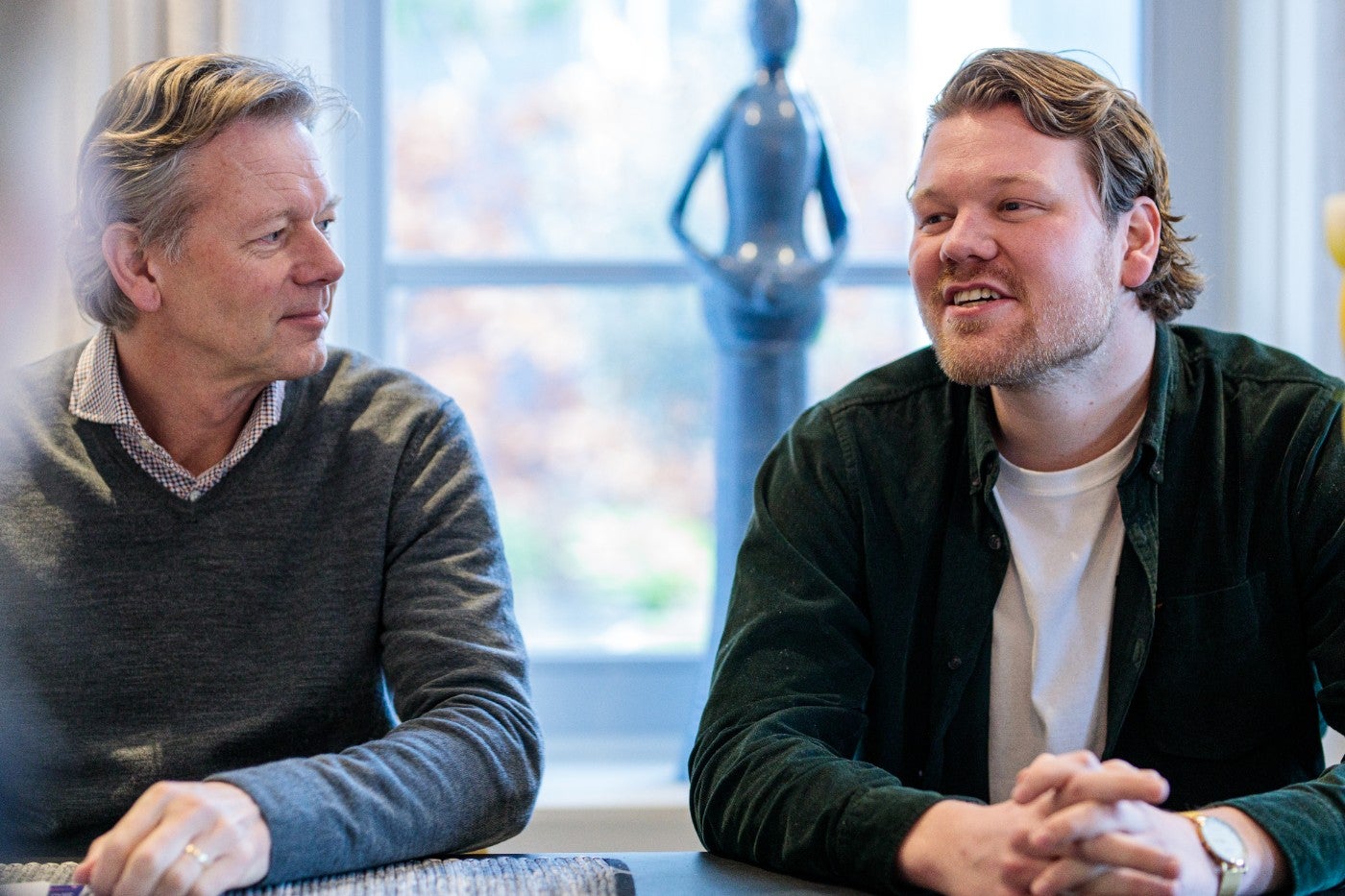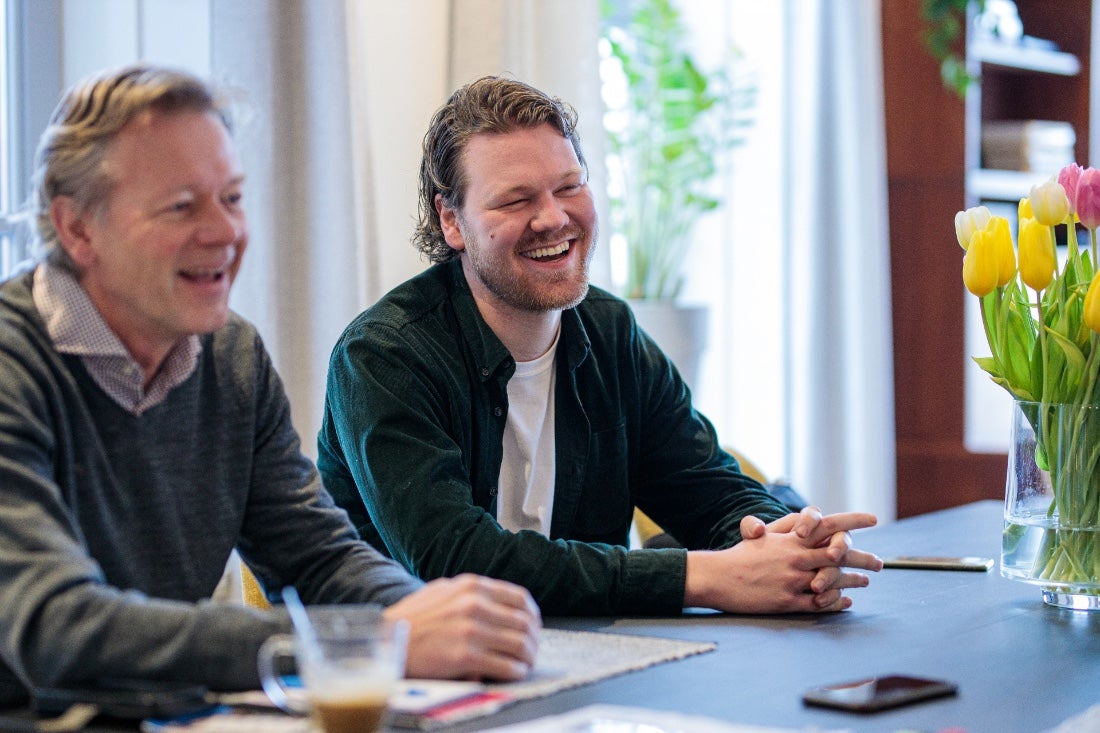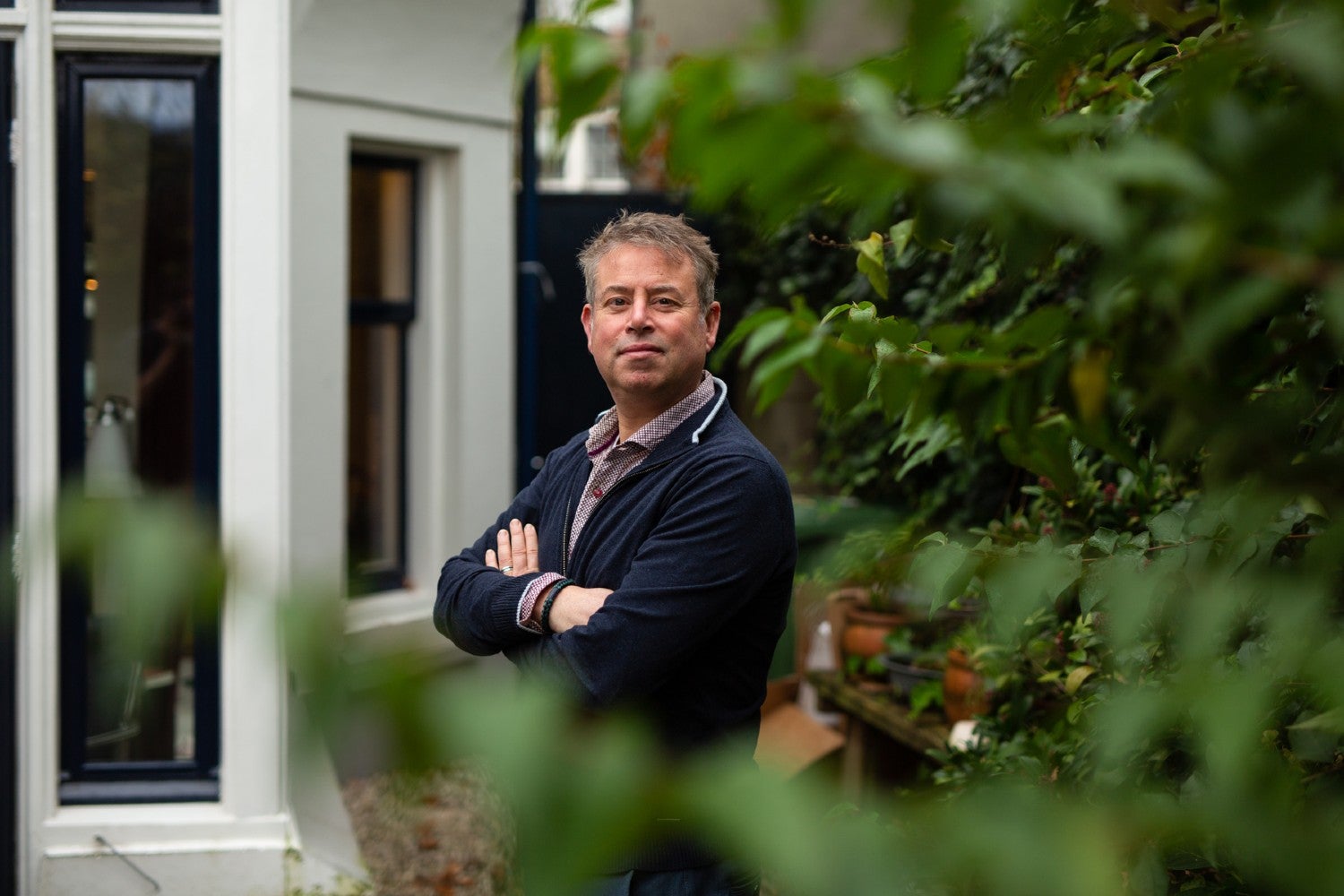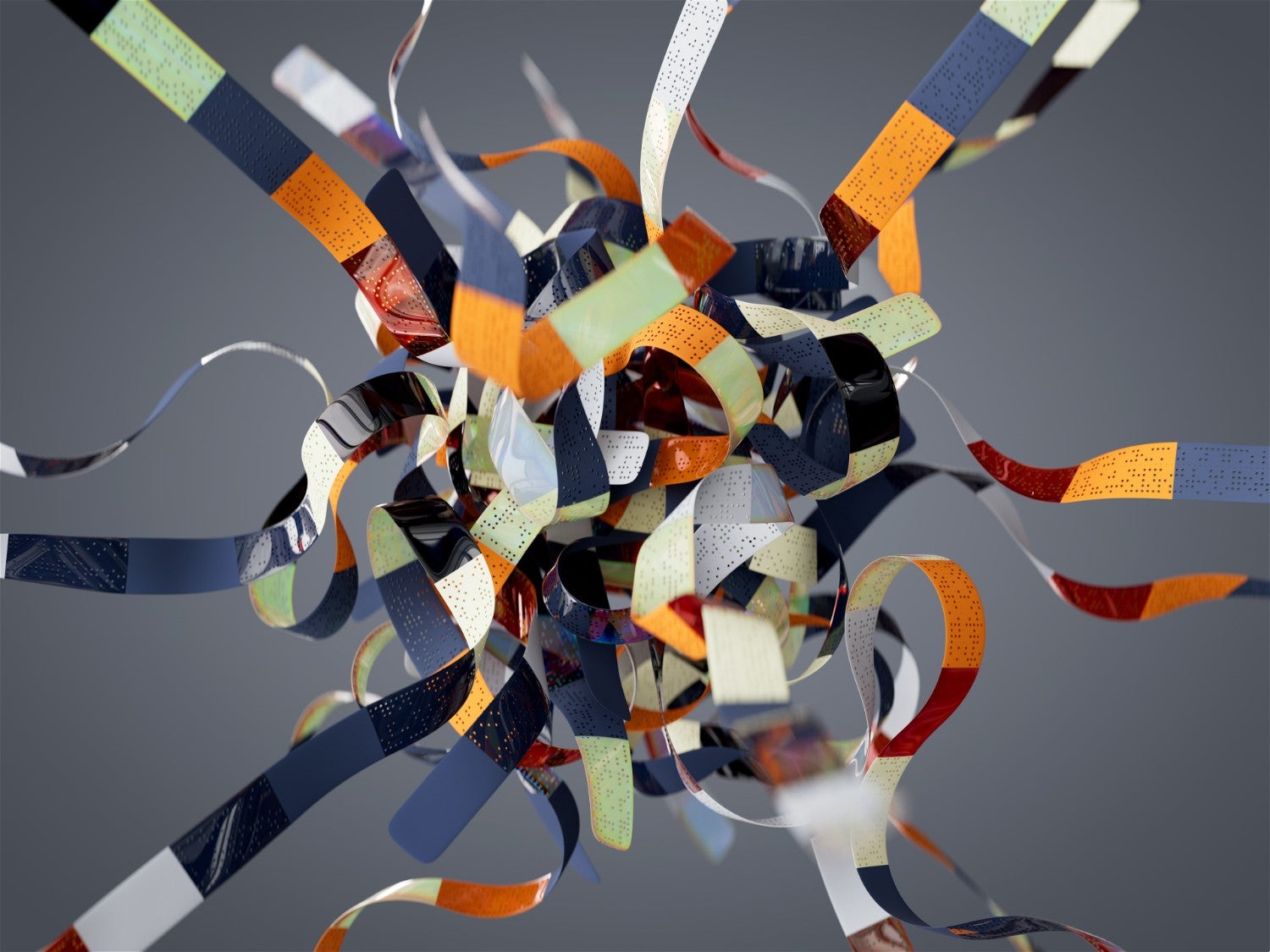A double interview with former Member of Parliament Joël Voordewind (57) and his son Manuel (29). Both men studied political science at VU Amsterdam, are active members of the ChristenUnie and live in Amsterdam North.
Joël: „I tried my best to warn him off political science. You can get hooked on politics and before you know it you’re spending nights pouring over files and documents. More importantly, I wanted him to feel free to make his own choices. I dragged him along to countless open days and events for other courses, but his mind was made.”
Manuel: „Once something gets stuck in my head...”
Joël: „I have to admit that I’m quietly chuffed. I have a very good idea of everything he’s working on. We call every day to talk about work, his career, and the grandchildren.”
Manuel adds: „My father is the first person I call when I'm worried about something."
You both studied political science at the VU. Did you have similar experiences?
Manuel: „For me, the course was entirely different from what I had expected. I imagined that we would have lively discussions about all sorts of current affairs during lectures, but the modules ended up being very theoretical, very big-picture-oriented, looking into different political currents.”
Joël: „Things were different in my time, when we were still in the Cold War and US-Russian relations were fraught at best. I can remember particularly fierce debates. I wrote my final thesis about Gorbachev, asking whether he was friend or foe. My conclusion was that he had good intentions, but I was very afraid that he would be deposed while I was still writing. Every morning, I woke up to my radio alarm clock, hoping that he was still in power, as my thesis would have been rather pointless if he was not. Fortunately, that didn't happen until three months after I finished. I still owe him a big debt of gratitude."
Manuel: „Perhaps the programme mirrors the zeitgeist. When I was a student, the world of politics was relatively peaceful.”
Joël: „I imagine that we were more activistic: we even occupied the university to draw attention to the Sandinistas in Nicaragua and Nelson Mandela’s ANC. Whenever I gave lectures at universities or student associations during my time as an MP, most questions I was asked were about housing or student funding, rather than wars in other parts of the world. Students were much more focused on their studies and careers, but - I’ll admit - they had much less time to graduate than we did.”

Manuel, you followed your father’s footsteps and went into politics. Was he a role model for you?
Manuel: „Absolutely. I was 14 when he became an MP. I regularly got to accompany him to The Hague, to talks with other politicians, and even on visits to the UN in New York or refugee camps in Jordan. I saw first-hand how people looked up to my father, which made me very proud.”
Joël: „Remember our trip to India? I wanted to show him to horrible consequences of child labour and hoped that he would be cured of his love of designer brands if he saw all misery they wrought.”
Manuel: „What struck me was how campaigns he came up with were actually implemented a few years later, like the anti-alcohol campaign that raised the minimum drinking age from 16 to 18 and the ban on smoking in the hospitality industry. My view of politics has changed in recent years. Life as a politician is more unruly, you have less time and have to work on seven different dossiers at the same time.”
Joël: „I became an MP during Balkenende’s 4th cabinet, which consisted of three parties: CDA, PvdA and us. It was a lot easier to close deals back then. Deal-making is a lot slower when there are this many parties involved, and debates in the House have been incredibly polarised. With today’s short time limits, there’s hardly any time for a good exchange of arguments. I was an MP for almost 15 years, but the average tenure has now dropped to 5 years.”
Why do you think that is?
Joël: „The political arena has changed and politicians have a lot more to worry about: Are you visible enough? Are you on enough talk shows? The electorate votes for people, rather than for what they have to say. Attitudes in society are getting harder, and you’re an easy target on social media. I’ve also been threatened and people have even pelted our home with tomatoes. I can handle it quite well, but I try to steer clear of Twitter.”
Manuel: „It’s more of a struggle for me. People say horrible things about my dad and about our family. It’s bizarre to me and I’d prefer to challenge each and every one of them. Having a family of my own has made me rethink whether I’d like to be an MP.”
What are your thoughts on Manuel running?
Joël: „Maybe when he's a little older. I admire new MPs who manage to strike a balance between their work and raising young children. People with a bit more life experience can rely on their experience when dealing with difficult cases. As a policy officer, I also stopped working in parliament at one point because I wanted to see and learn more about the world first. We started working with refugees in Iraq before focusing on street children in Brazil.”

Manuel, you work with Tearfund as a political advisor. What is it that you do?
Manuel: „We provide development aid abroad in collaboration with local churches. People get uncomfortable when they hear about the religious aspect, and - as a particularly secular country ourselves - tend to forget that over 80% of the world is religious. In other countries, churches and mosques play a much bigger role in political and intra-community decisions. It’s beyond me why the ministry of foreign affairs couldn’t work with faith communities. It’s often down to the civil servants themselves and their personal aversion to religion, because they struggle to separate it from their own experiences. What’s more, politicians prefer not to be seen fraternising with local imams because of associations with terrorism. In the Netherlands, religion appears to be something to be avoided at all costs.”
Joël: „People level the same criticism at Christian organisations like Youth for Christ or the Salvation army, pointing at separation of church and state, while all they want to do is good works in the name of their Christian faith.”
Did the Christian aspect of VU play a part in choosing a university?
Manuel: „VU was the obvious choice for me because my dad studied there. Besides, the university is a bit more compact and better organised than the University of Amsterdam. I can be chaotic at times, so VU was a better fit for me. I did end up having to bike 45 minutes every day, passing the University of Amsterdam on the way. It took some getting used to. There weren’t any Amsterdam locals in my group - only ‘provincial kids’, as my friends and I called them.”
Joël: „I deliberately chose VU for its Christian identity, although it wasn’t as pronounced as I’d hoped. It wasn’t until I spent some time at a university in the US that I came across Abraham Kuyper. Americans loved him and his work, but I’d never heard about him at VU. In my first philosophy lecture, the first question the lecturer asked was ‘who still believes in absolute truth?’ I was naive as could be and raised my hand, and I still remember Mr Schaap saying: ‘Well, then you’re in for a roller coaster ride.’ Unfortunately, I cannot remember my time at the VU as being particularly Christian, which is a shame. If I were in charge, I’d be proud of the Reformed foundations of the university. In the US, I studied at an Orthodox Christian university. That is where I truly deepened my faith, which, as a minister’s son, I had been brought up with.”
Is your faith as unshakable as your father's?
Manuel: „I have had my doubts, especially as a teenager, and I still do have doubts when I see how harsh Christians can be on refugees or when I look into LGBTQ+ issues. Still, I can live with my doubts. My faith is not self-evident or dogmatic: I choose to believe every day. I was not baptised until I turned 18 and deliberately chose to be.”
Are there things you disagree about?
Manuel: „I think that the climate is a more important issue for me, and I’m more committed than ever to pass on a beautiful world to future generations now I have a family of my own. I would like to join in with the demonstrations, but I don’t see you doing that anytime soon.”
Joël: „I know how important it is for you, and preserving God’s creation is important to me, too. I do believe that politicians also have a lot of other things to say about how we should treat each other and how the Netherlands and world should be organised. Take human rights, for instance, or child labour and the norms and values you espouse as a government. As an alderman of Alkmaar, I’m fighting hard to curbing drug use and limiting the number of coffee shops in the city. Everyone seems convinced that it’s best to keep drugs in the open because it lets you stay in control, while barely anyone seems worried about the effects of soft drug use on young people. In fact, today’s high-THC marijuana strains are practically a hard drug and very addictive.”
Manuel: „I’ve found all these blanket bans a bit patronising at times, but as I’m getting older and have children of my own, I find myself coming across to my father’s point of view more and more often.”








